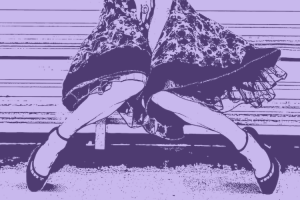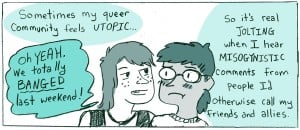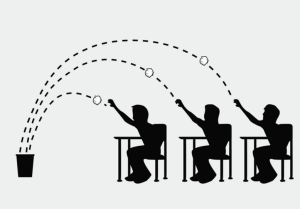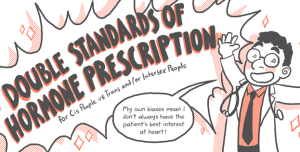Originally published on The Body Is Not an Apology and republished here with permission.
During the course of 2016, I saw more ableist slurs tossed around than ever before.
From casual conversation to mass media broadcasts, people are referring to one another in the most dehumanizing ways possible – and throwing disabled people under the bus in the process.
I feel exhausted because it seems like no one is above it. Some of the most consistent advocates I know have regularly referred to current events as “crazy” and what have you.
It hurts because it feels like a betrayal every time.
That said, I understand how difficult it can be to change the way you speak. It’s extremely difficult for me personally as a neuroatypical person. I still make mistakes in instances where I know better.
What’s upsetting to me is when people defend the ableist language that they use, or refuse to fully consider the possibility that they should change.
One word in particular that I have encountered some resistance around is the word “stupid.” Numerous people either don’t understand why this word is ableist, or think that the value of the word supersedes the harm it causes to disabled communities.
This resistance is oddly pervasive.
People who wouldn’t use the word “dumb” because it’s offensive to deaf people and people who can’t speak, or the r-word because it’s offensive to people with developmental disabilities, are still willing to describe something or someone as “stupid.”
In my view, the fact that this word is a slur is self-evident. People don’t call you “stupid” unless they’re trying to put you down or undermine you. It’s an insult, and that’s reason enough to stop using it.
However, most people see the term as a legitimate expression conveying unintelligence, ignorance, foolishness, and so on.
Even though other words are available, people feel that they need this one. I think it encapsulates the anger, frustration, and exasperation that they feel toward people who are behaving harmfully.
Many of us are feeling these things toward the illogical, destructive, and cruel people who endanger our safety and security.
Calling those people “stupid” may be cathartic, but it doesn’t communicate as much about the problem as the other words that are available. Compared to words like “bigoted,” “belligerent,” or “thoughtless,” its only strength is that it’s demeaning.
So it’s an insult. But what makes the term ableist?
First of all, it’s used to insult people with cognitive impairments, autism, Down syndrome, ADD, and other developmental disabilities. That’s a good enough reason right there.
Its use harms and triggers disabled people, which can make it a source of mass psychological harm for an already marginalized group.
If something is likely to upset the members of a marginalized group, just let it go. If community members and activists ask you not to use a word for this reason, just don’t use it. Listen to those people and don’t make excuses.
Ignoring those requests is also ableist.
Secondly, “stupid” is ableist because it creates and enforces systemic and institutional bias.
The history of disability in our society is rife with injustices based on intelligence. During the 20th century, the United States government sterilized approximately 70,000 people, starting with women who were deemed to be “imbeciles.” And that’s just one example.
Here’s another: Children with intellectual disabilities are at extremely high risk for abuse, including sexual assault. Women with intellectual disabilities are also at high risk for abuse, sexual assault, and domestic violence – and are underserved by inaccessible support programs.
Our culture promotes a climate of toxicity toward intellectually disabled people, and part of that is in the words we use.
By condoning the casual use of ableist slurs, we tacitly permit more severe abuses. Because we undermine the people, we also undermine accountability for their abusers. We fail to construct a healing path forward.
The frustration we feel over bigotry can be expressed in so many ways. We don’t need to rely on ableist slurs.
Alternative phrases are more descriptive, and more accurate – unintelligence isn’t the prevailing problem with right-wing extremists, for instance, nor is it the cause of their actions. Ignorance, prejudice, and disregard for the rights of others are.
Conflating harmful actions with lack of intelligence does everyone a disservice.
To suggest that “stupidity” is what makes people act badly undermines any real accountability. The causes of problematic behavior rarely have anything to do with mental acuity, and we can’t properly address harmful behavior while being so reductive about its causes.
Carelessness, bias, hatred, greed, closed-mindedness, indifference – these are the traits that lead to oppression. Our intelligence isn’t the issue so much as our sense of compassion and justice.
A person can be unintelligent and still know right from wrong. There are people with cognitive disabilities who I respect a thousand times more than those who are supposedly more abled.
They have stronger principles, seek to better themselves, and are committed to being good people. They are just as capable of being sensitive and caring as everyone else. To imply that they aren’t is outrageous.
I get it. Changing the way we speak is really tough. Words are the fabric of our thoughts. Re-forming the words we use means reshaping our minds. But that’s exactly why it’s so necessary and so potent.
Just as we can’t shape a new society without fully deconstructing the old, we can’t liberate our minds without dismantling the ways we think and communicate.
It’s genuinely an enormous undertaking. But, it’s more than achievable, and it doesn’t require sacrificing anything that isn’t better left behind anyway.
The most important thing is mindfulness. Actually noticing it every time we use those words is the biggest and hardest step. We’re so used to hearing them that they don’t even register.
Thinking of something different to say is also hard because the first alternatives that come to mind are often just as problematic. For instance, it’s not so uncommon for me to stop myself from saying “stupid” only to defer to “crazy” instead.
That really just drives home the point that our entire way of thinking needs to be reevaluated. So much of it is built on dehumanization. We shouldn’t put people down as a mode of criticism – that’s something we need to develop a sensitivity toward.
Throughout the course of this article, I’ve tried to use a variety of different words that describe bigots truthfully and non-oppressively.
They’re many and varied, and in my opinion, they convey much more than the word “stupid,” which is so overused that it actually conveys very little. I can’t think of a good reason why you wouldn’t use all of these other words instead. They’re more impactful, and more accurate, if you care to invest in them.
Try these words on for yourself. Challenge yourself to criticize your opponents without demeaning their intelligence. Even if their actions are ridiculous, offensive, senseless, or malevolent.
Pause, think about what is actually upsetting you about their behavior, and choose a different descriptor. You’ll be in solidarity with the disability community if you do.
[do_widget id=’text-101′]
Search our 3000+ articles!
Read our articles about:
Our online racial justice training
Used by hundreds of universities, non-profits, and businesses.
Click to learn more





















